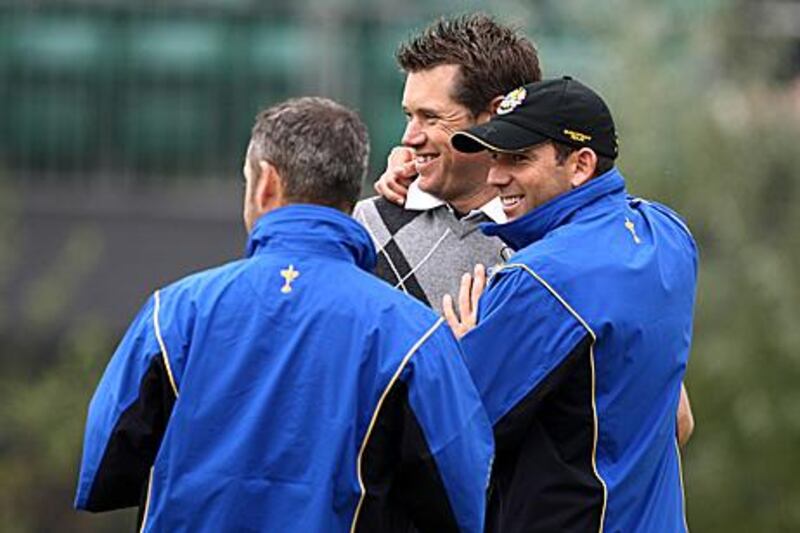When Europe's top golfers began to regroup after the despair of surrendering the Ryder Cup to America at Valhalla two years ago, Sergio Garcia was in the vanguard of those plotting to regain the trophy at Celtic Manor this weekend.
Only Padraig Harrington, shortly after the securing of a third major title in the 2008 US PGA Championship at Oakland Hills, could, at the time, consider himself above Garcia in the European hierarchy.
While Harrington has since suffered an alarming fall from grace - victory over a moderate field in his home Irish Open has been his only title since - and has felt the embarrassment of going cap in hand to Colin Montgomerie for a Ryder Cup wild card, Garcia's decline has been even more striking.
Nobody could have foreseen the Garcia slump when the charismatic Spaniard began his rehabilitation after Valhalla by capturing the Castello Masters and the prestigious HSB Champions titles in quick succession to romp into an early lead in the inaugural Race to Dubai.
Bafflingly, Garcia, who had also won the Players Championship, the American flagship event, in that stellar year, has not picked up another winner's cheque since as one errant shot has followed another.
His confidence is shattered, his form has deserted him and his status in a sport where he was formerly considered as the heir apparent to Tiger Woods as world No 1 has been gradually eroded to the point where you have to flick to the second page of the world rankings to find his name.
To say Garcia, who occupies 59th place on that ladder, is at a career crossroads is putting it mildly. His clubs lie temporarily idle while he totters anxiously along the road to redemption. There is no better recipe for regaining an appetite for the game, though, than occupying a meaningful role in a Ryder Cup campaign.
Garcia, 30, who has figured prominently in the last five clashes with the United States, especially in the difficult discipline of foursomes where he holds an enviable record of eight wins and a half from his nine appearances, realised months ago that a sixth call-up to the European line-up was out of the question.
His miserable failure to claim a top-10 finish in any strokeplay event this year meant he had no case whatsoever to present in staking a claim for one of the three precious Montgomerie wild cards.
So, he did the next best thing and went directly to Montgomerie during the British Open in July and asked to be made a vice-captain to supplement Thomas Bjorn, Darren Clarke and Paul McGinley, the three earlier nominations.
Montgomerie, who is on record as saying he did not feel the need to emulate Corey Pavin, his US counterpart, and name four lieutenants, readily changed tack. The Scotsman, himself a Ryder Cup hero, swiftly opened the Celtic Manor door to the man who has carried on the inspirational Spanish traditions of Seve Ballesteros and Jose Maria Olazabal in these biennial episodes of transatlantic rivalry.
With five members of the 12-man European team aged under 30 and making their debuts in this competition, Garcia's youthfulness compared to the other three vice-captains may prove invaluable to locker room morale.
And what harm can it do? Four vice-captains makes sense on the first two days when four pairs matches take place simultaneously. Garcia's previous successes in foursomes and fourballs will make his presence on the Twenty Ten course even more significant while he can be as jingoistic as anybody when it comes to cheering on the 12 singles campaigners.
While Garcia's exclusion from the playing side of affairs at Celtic Manor was inevitable, Harrington, the man who denied him glory at the 2007 British Open and the 2008 US PGA, is fortunate to be in the team.
There is no room for sentiment in a competition of this importance and Montgomerie may rue his decision to rely on past reputations when calling up the Irishman ahead of Paul Casey and Justin Rose, two Englishmen who have triumphed this year on American soil.
Harrington is a tough character, though, and, happily for the European prospects, has shown signs of a return to decent form over the past couple of weeks.
His performances over the next three days will be scrutinised almost as much as those of Woods, who because of a self-imposed break from the sport to sort out his marital affairs, also required a captain's pick to return to the Ryder Cup fold after missing Valhalla through injury. The captain's job is a privileged one and one that is carried out with immense pride.
That pride can be tarnished by a wild-card flop. It is up to Harrington and Woods to spare Montgomerie and Pavin such anguish.
wjohnson@thenational.ae





